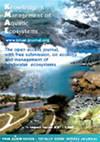在缺乏现有参考条件的情况下,巴拉顿湖生态状况的鱼类评价指标的建立
IF 1.7
3区 环境科学与生态学
Q3 FISHERIES
引用次数: 6
摘要
根据欧洲水框架指令(WFD)的标准,提出了一个以鱼类为基础的指数来指示匈牙利巴拉顿湖的生态状况。巴拉顿鱼指数(BFI)综合了13种湖泊特有鱼类指标的信息,包括本地组合物种丰富度、本地关键物种的相对丰度、生物量和年龄结构、非本地物种的代表性和总体健康状况的刺网和电捕捞数据。考虑到的主要人为压力是沿海生境的退化、非本地鱼类物种的入侵、富营养化和捕鱼/垂钓(包括放养)。生态质量比(EQR)是将实际鱼类群落指标与专家根据鱼类区系及其变化的最新和历史信息重建的假定未受干扰的巴拉顿湖参考状态相关联来评估的。2005-2018年巴拉顿湖BFI值基本一致,表明巴拉顿湖生态状况良好。本研究提供了一个例子,说明如何在没有可能对压力响应关系进行统计评估和精确确定参考状态的独特生境中建立EQR评估方法。本文章由计算机程序翻译,如有差异,请以英文原文为准。
Development of a fish-based index for the assessment of the ecological status of Lake Balaton in the absence of present day reference condition
A fish-based index is proposed to indicate the ecological status of Lake Balaton, Hungary in accordance with the standard of the European Water Framework Directive (WFD). The Balaton fish index (BFI) synthetises information of 13 lake-specific fish metrics including gillnetting and electric fishing data of species richness of native assemblages, relative abundance, biomass and age structure of native key species, representation of non-native species and general health status. The main anthropogenic pressures considered were the degradation of littoral habitats, invasion of non-native fish species, eutrophication and fishing/angling including stocking. Ecological quality ratio (EQR) is assessed by relating actual fish assemblage metrics to the supposed undisturbed reference status of Lake Balaton reconstructed by expert judgement based on recent and historic information on the fish fauna and its changes. Values of BFI were consistent and indicated good ecological status of Lake Balaton in the period of 2005–2018. This study provides an example on how an EQR assessment methodology might be established in unique habitats with no possibilities for statistical evaluation of pressure-respond relationships and exact determination of the reference status.
求助全文
通过发布文献求助,成功后即可免费获取论文全文。
去求助
来源期刊

Knowledge and Management of Aquatic Ecosystems
环境科学-海洋与淡水生物学
CiteScore
3.70
自引率
5.60%
发文量
22
审稿时长
>12 weeks
期刊介绍:
Knowledge and Management of Aquatic Ecosystems (KMAE-Bulletin Français de la Pêche et de la Pisciculture since 1928) serves as a foundation for scientific advice across the broad spectrum of management and conservation issues related to freshwater ecosystems.
The journal publishes articles, short communications, reviews, comments and replies that contribute to a scientific understanding of freshwater ecosystems and the impact of human activities upon these systems. Its scope includes economic, social, and public administration studies, in so far as they are directly concerned with the management of freshwater ecosystems (e.g. European Water Framework Directive, USA Clean Water Act, Canadian Water Quality Guidelines, …) and prove of general interest to freshwater specialists. Papers on insular freshwater ecosystems and on transitional waters are welcome. KMAE is not a preferred journal for taxonomical, physiological, biological, toxicological studies, unless a clear link to ecological aspects can be established. Articles with a very descriptive content can be accepted if they are part of a broader ecological context.
 求助内容:
求助内容: 应助结果提醒方式:
应助结果提醒方式:


